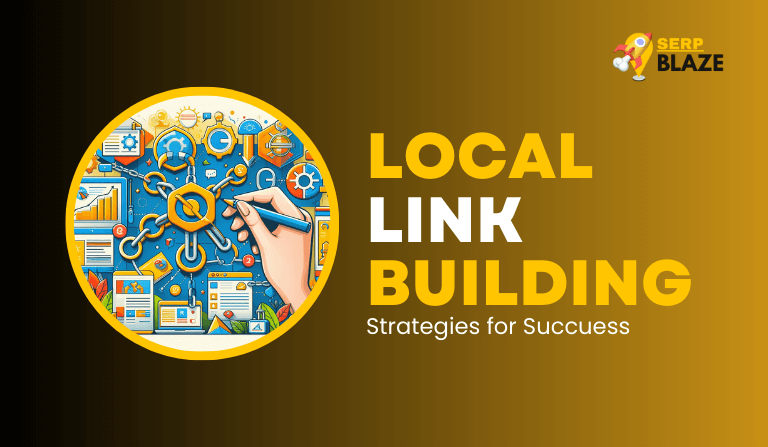Table of Contents
ToggleMaster On-Page SEO for Local Business
On-page optimization also known as On-Page SEO plays a crucial role in driving targeted traffic to your local business. By using relevant keywords and location-based information on your website, you can attract potential customers who are specifically searching for products or services within their local area. For instance, if you run a bakery in San Francisco, optimizing the web pages of your small business with phrases like “best bakery in San Francisco” can help people in the vicinity find your business online.
Optimizing the content on your website with location-specific keywords ensures that when someone searches for a particular product or service near them, search engines recognize your relevance and display your business in the search results.
Enhancing Visibility
Implementing on-page optimization strategies enhances visibility for local searches. When users look for businesses similar to yours within their geographical area, having well-optimized web pages increases the likelihood of appearing at the top of search engine results. This increased visibility not only drives more traffic to your site but also improves brand awareness among local audiences. With these local SEO efforts, you can get the rankings of your website in service area business.
Mastering Local Keyword Research for On-Page Success
Using Google Keyword Planner
Tools like Google Keyword Planner are invaluable. This tool allows you to identify the most relevant and high-value local keywords by providing insights into their search volumes and competition levels. For instance, if you own a bakery in Chicago, using this tool can help you discover which specific keywords related to your business have the highest search volumes within your local area.
By utilizing Google Keyword Planner, businesses can gain a clear understanding of the popular search queries made by users in their locality. This insight enables them to tailor their website’s content and meta tags with these specific local keywords, thereby increasing the likelihood of appearing in relevant local search results.
Long-Tail Keywords for Local Intent
In addition to broad keywords, it’s crucial for businesses to consider incorporating long-tail keywords that reflect specific local intent. For example, instead of targeting “bakery” as a keyword, focusing on long-tail variations such as “best cupcakes in downtown Chicago” or “artisan bread near Millennium Park” can attract more qualified leads who are actively seeking products or services within a particular location.
Utilizing both broad and long-tail local keywords ensures that businesses optimize their landing pages and create targeted location pages, making it easier for potential customers to find them when conducting localized searches on search engines.
Read this for Local Keywords: The Ultimate Guide to Local Keyword Research for Business Growth
Crafting Compelling, Locally Relevant Content
Tailored Content Creation (Semantically Optimized with Entities)
Crafting compelling, locally relevant content is crucial for successful on-page optimization. By tailoring your content to local interests and needs, you can effectively engage with your target audience. For instance, if you’re a local bakery, sharing recipes inspired by regional flavors or discussing community events can resonate well with your audience.
Creating content that resonates with the community involves incorporating local events, news, and references into your material. This could include covering topics such as neighborhood gatherings, city-wide celebrations, or even highlighting the achievements of local individuals or businesses. By doing so, you establish a deeper connection with your audience while also increasing the chances of appearing in the local pack on search engine results pages.
Addressing Local Pain Points
Addressing local pain points and providing solutions through content is another effective strategy for Local SEO optimization. Let’s say you run a plumbing business—creating blog posts or articles addressing common plumbing issues specific to your area can be immensely beneficial. You could provide tips on how to prevent frozen pipes during cold winters in northern regions or discuss ways to conserve water in drought-prone areas.
Optimizing Meta Tags and Headers for Local Relevance
Including Location-Based Keywords
When optimizing meta tags and headers for local relevance, it’s crucial to include location-based keywords in the meta titles and descriptions. For instance, if a business operates in New York City, incorporating phrases like “New York City” or “NYC” can significantly boost local search visibility. This helps search engines understand the geographic focus of the content.
When creating meta descriptions, including specific neighborhood names or landmarks can further enhance local relevance. For example, using phrases like “near Central Park” or “in Brooklyn Heights” can attract users searching for businesses within those areas.
Utilizing Header Tags
Utilize header tags strategically to emphasize local relevance within on-page content. When writing about products or services offered in a particular location, incorporating header tags with relevant geographical terms is essential. For instance, using headers such as “Best Restaurants in Downtown LA” or “Top Attractions in San Francisco Bay Area” signals to both users and search engines that the content is tailored to a specific locale.
Consistency between On-Page Content and Meta Tags Ensuring consistency between on-page content and meta tags is vital for effective on-page optimization. If the meta title highlights a business’s location-specific service offering, it’s essential that the corresponding web page contains detailed information about those offerings within that particular locality. Inconsistencies may lead to confusion among visitors and hinder search engine rankings.
Enhancing Local Visibility with Google Business Profile Optimization
Claim and Verify Your Listing
To enhance your local visibility on Google Map, it’s crucial to claim and verify your Google Business Profile listing. This ensures that you have control over the information displayed about your business. By claiming your listing, you can provide accurate details such as your location, phone number, and other essential business information.
Once claimed, make sure to optimize the provided business information, categories, and attributes. Follow these basic local SEO tips in local SEO strategy For example, if you offer services like “heater repair,” be sure to add this specific category to attract potential customers searching for these services in their area. Optimizing these details will help boost your online presence when people search for businesses like yours on.
Encouraging customer reviews is another key aspect of Google My Business optimization. That will help in achieving better position search results and Local map pack search result as well. Positive online reviews not only influence potential customers but also signal trustworthiness to Google’s search algorithm. Responding promptly to reviews, whether positive or negative, demonstrates active engagement with customers and helps build a positive reputation for your business.
Encourage Customer Reviews
By encouraging satisfied customers to leave reviews on your Google My Business listing, you can significantly enhance its visibility in local searches. When potential customers see a high rating coupled with positive feedback from previous clients looking for “heater repair” services in the area, they are more likely to choose your business over competitors.
Responding promptly to both positive and negative reviews also shows potential clients that you value customer feedback and are committed to providing excellent service. This level of engagement further boosts the credibility of your business within local listings on Google. You must use Google ad if you want to get the maximum traffic share if your local business website rankings are down in the local search results.
Building Local Authority through Quality Inbound Links
Seek Backlinks
Acquiring backlinks from locally relevant and authoritative websites is crucial for on-page optimization. These backlinks act as “upvotes” for your website, signaling to search engines that your site is a trusted source of information. For example, if you run a local bakery, obtaining backlinks from food blogs or local event websites can significantly boost your online visibility.
Partnering with other local businesses also presents excellent opportunities for link-building. By collaborating on events, promotions, or joint projects, you can naturally integrate links to each other’s websites. This not only enhances your authority, but it also fosters a sense of community within the local business landscape.
Focus on Quality
Always prioritize quality over quantity. A few high-quality backlinks from reputable sources carry more weight than numerous low-quality links. For instance, having a link from an established local news outlet or an industry-specific association can greatly enhance the credibility and trustworthiness of your website in the eyes of both users and search engines.
In addition to external linking efforts, internal linking within your own website is equally important for on-page optimization. Creating location-specific landing pages and strategically placing internal links throughout your site helps improve user experience and reinforces the relevance of different pages to search engines.
Leveraging Local SEO Tools and Analytics for Optimization
Citation Management
Utilizing local SEO tools like Moz Local or BrightLocal can significantly enhance your website’s performance. These tools help in local citation management, ensuring that your business information is accurately listed across various online platforms, which is crucial for local search visibility. For example, if your business changes its address or phone number, these tools can ensure that the updates are reflected consistently across different directories and local citations as well.
Citation consistency plays a vital role in improving geo-specific search engine rankings. By managing citations effectively, you signal to search engines that your business information is reliable and trustworthy, thus positively impacting your organic results.
Analyzing Performance
Analyzing local search performance using Google Analytics and Google Search Console provides valuable insights into how users interact with your website within specific geographic locations. This data allows you to identify areas where improvements are needed and tailor services according to the preferences of local customers. Keep an eye on the technical SEO of your website for speed and better performance as it’s now one of the major Local SEO ranking factors as well in local digital marketing.
Moreover, monitoring local keyword rankings helps track the progress of on-page optimization efforts. By keeping an eye on how well your website ranks for relevant location-based keywords such as “heat pumps service,” you can refine strategies based on real-time feedback from search engine crawlers.
Implementing Advanced Strategies for Multi-City Local SEO
Individual Location Pages
Creating individual landing pages for each location you target is crucial. These pages should contain relevant information about the specific city or area, such as address, phone number, and testimonials from customers in that location. For example, if a business offers services in multiple cities, having separate landing pages optimized with keywords specific to each city can significantly boost its visibility in local searches.
Implementing hreflang tags allows businesses to cater to audiences who speak different languages or reside in various regions. By using hreflang tags, websites can indicate which language and geographical targeting apply to specific pages. This ensures that users are directed to the most relevant content based on their language and location preferences. Reach your potential customer by using social media platforms for business website content marketing, Optimize your business website with local search engine optimization for top position in Google search.
Leveraging Schema Markup
Leveraging schema markup is another advanced strategy for multi-city local SEO. This structured data helps search engines understand the context of your content better by providing specific details about your business locations at a granular level. For instance, including schema markup for different service areas or zip codes enables search engines like Google to display more accurate information about a business’s coverage areas when users conduct local searches.
Closing Thoughts
You’ve now unlocked the secrets to mastering on-page optimization for local SEO. By understanding the role of local SEO in business growth, mastering local keyword research, using relevant keyword in your content crafting compelling content, and optimizing meta tags and headers, you’re well on your way to enhancing your local visibility. Don’t forget to leverage Google My Business optimization, build local authority through quality inbound links, and implement advanced strategies for multi-city local SEO. With the right tools and analytics at your disposal, you can take your local SEO success game to the next level. You can get top-notch local SEO services from us (SerpBlaze). Now, it’s time to put these strategies into action and watch your local online presence soar!
Frequently Asked Questions
What is the role of local SEO in business growth?
Local SEO plays a crucial role in helping businesses attract nearby customers and improve their online visibility. By optimizing for local search, businesses can connect with potential customers in their area and drive more foot traffic to physical locations.
How can I master local keyword research for on-page success?
To master local keyword research, focus on identifying relevant keywords that are specific to your target location. Use tools like Google Keyword Planner or SEMrush to find localized keywords with moderate to high search volume and optimize your content accordingly.
Why is crafting compelling, locally relevant content important for on-page optimization?
Crafting compelling, locally relevant content helps businesses establish authority within their target geographic areas. By creating valuable and engaging content tailored to the local audience’s interests and needs, businesses can enhance user engagement and improve their chances of ranking higher in local search ranking.
What are the benefits of optimizing meta tags and headers for local relevance?
Optimizing meta tags and headers for local relevance helps search engines understand the geographical focus of your content. This improves the likelihood of appearing in relevant local searches, driving targeted traffic to your website or physical location.
How does enhancing Google My Business optimization improve local visibility?
Enhancing Google My Business optimization ensures that your business information appears prominently in Google’s Local Pack and Maps results. This increases visibility among potential customers searching for products or services within your locality, ultimately driving more leads and conversions.
Why is building local authority through quality inbound links essential for on-page optimization?
Building local authority through quality inbound links signals credibility to search engines while also improving visibility within specific geographic regions. High-quality backlinks from reputable sources help establish trustworthiness and relevance within the context of localized searches.
How can leveraging Local SEO tools and analytics benefit my optimization efforts?
Leveraging Local SEO tools allows you to gain insights into how users interact with your site at a granular level based on location data. These tools enable you to make informed decisions about optimizing content, understanding user behavior patterns by region, and tracking performance metrics across different locales.



